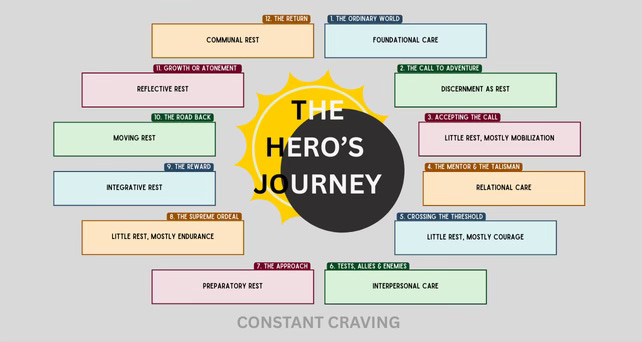From Exhaustion to Elixir: Rethinking the "Hero’s Journey"
Where Does Self-Care Fit into the Great Monomyth?
A Caregivers’ Dilemma
This is the internal conflict I keep circling: where does self-care belong in the story we tell about struggle, liberation, and responsibility? Is there room for tending my own body, my own heartmind, while also carrying the weight of caregiving and the grief? If so how do I do it?
Joseph Campbell and the Missing Pause
Joseph Campbell, the mythographer best known for shaping the theory of the “monomyth” or Hero’s Journey, described it like this:
“The hero must depart from the world of common day into a region of supernatural wonder… trials are encountered, a decisive victory is won, and the hero comes back… with the power to bestow boons on his fellow man.”
In Campbell’s telling, we are all the hero. And the trials and subsequent growth they offer in our life are heroic even in their simplicity. For me, it’s looked like addiction and sobriety or becoming a mother. For you it may look different. But he insists the cycle is consistent in myth and in life—departure, ordeal, return.
But where in that cycle is rest? Where is healing, integration, or pause? Campbell emphasized the tests and triumphs, the action of the myth. Yet embedded in the cycle are thresholds that imply care.
Rest Along the Hero’s Path
If we look again, each stage of the journey has its own kind of rest—or its own demand for endurance. Not every phase allows for pause, but completion of the journey requires it.
The Ordinary World → Foundational Rest
Rituals of daily rhythm: rest, nourishment, zazen, morning walks. Care as ordinary ground.The Call to Adventure → Discernment as Rest
Stillness long enough to hear: silence, meditation, divination.Accepting the Call → Little Rest, Only Momentum
The body moves with adrenaline; care is trust.The Mentor & The Talisman → Relational Rest
Receiving guidance, letting oneself be held by lineage, friendship, or fellowship.Crossing the Threshold → No Rest, Only Courage
Care is resolve: a breath, a mantra, an invocation.Tests, Allies, & Enemies → Communal Rest
Circle, laughter, shared meals—care in solidarity.The Approach → Preparatory Rest
A sabbath before the storm: sleep, prayer or meditation, grounding.The Supreme Ordeal → No Rest, Only Endurance
Care is stripped down: breath, mantra, survival.The Reward → Integrative Rest
Feasting, gratitude, savoring what has been won.The Road Back → Moving Rest
Pacing, walking, steadying rituals woven into movement.Growth or Atonement → Reflective Rest
Journaling, confession, circles of reconciliation.The Return → Communal Rest
Being received, storytelling, sharing the elixir.
The myth hides its moments of rest, and we inherit the lesson to valorize the battles while ignoring the places where the hero collapses into arms that hold them.
Boundaries, Nervous Systems, and Love
Contemporary psychiatrist and author Pooja Lakshmin also reframes the concept. In her book Real Self-Care, written from her experience as both a clinician and a woman navigating cultural expectations of overwork, she insists that real self-care is not about spa days or scented candles. It is the deeper work of boundaries, of saying no, of refusing to perform exhaustion as virtue.
As a mother of a toddler, I am practicing with these teachings viscerally. Motherhood is itself a mythic ordeal: relentless nights, endless repetition, no clean arc from departure to victory to return. It is the belly of the whale, lived daily. It is also initiation into surrender, patience, a love so embodied it feels like breathing. The monomyth is too linear to hold this, but caregiving reveals its own heroism. Sometimes the greatest feat is not the epic journey outward, but the willingness to remain, to tend, to keep returning each morning with no applause and no rest.
Filling the Gap
So where does self-care fit into doing the dishes when everything is the dishes and all the dishes need doing? The danger is falling into the myth of the lone hero. That story tells me I must keep going, burn out if necessary, win the battle or fail. But healing is not a lone quest. It is interdependence. If I neglect myself, I can’t keep showing up for my family or for movements I care about. If I collapse, I bring no elixir back to the community.
The monomyth leaves a gap. Spiritual care asks us to fill it with rituals of pause, with circles of mutual holding, with recognition that we are each both hero and helper, both in need and in service.
The myths we inherit shape our reality. If the story we follow omits care, we will enact exhaustion. If the story makes space for rest, nourishment, and healing, then our rituals will, too. The hero is never truly alone. Every jewel reflects every other in Indra’s Net. Care is not outside the journey. It is how we get through it.
In spiritual solidarity,
🧿 Constant Craving ✨



Odysseus rested (unintentionally against his will usually through goddesses’ spells) on islands for years on his journey back to Ithaca
Spectacular- I really enjoyed this